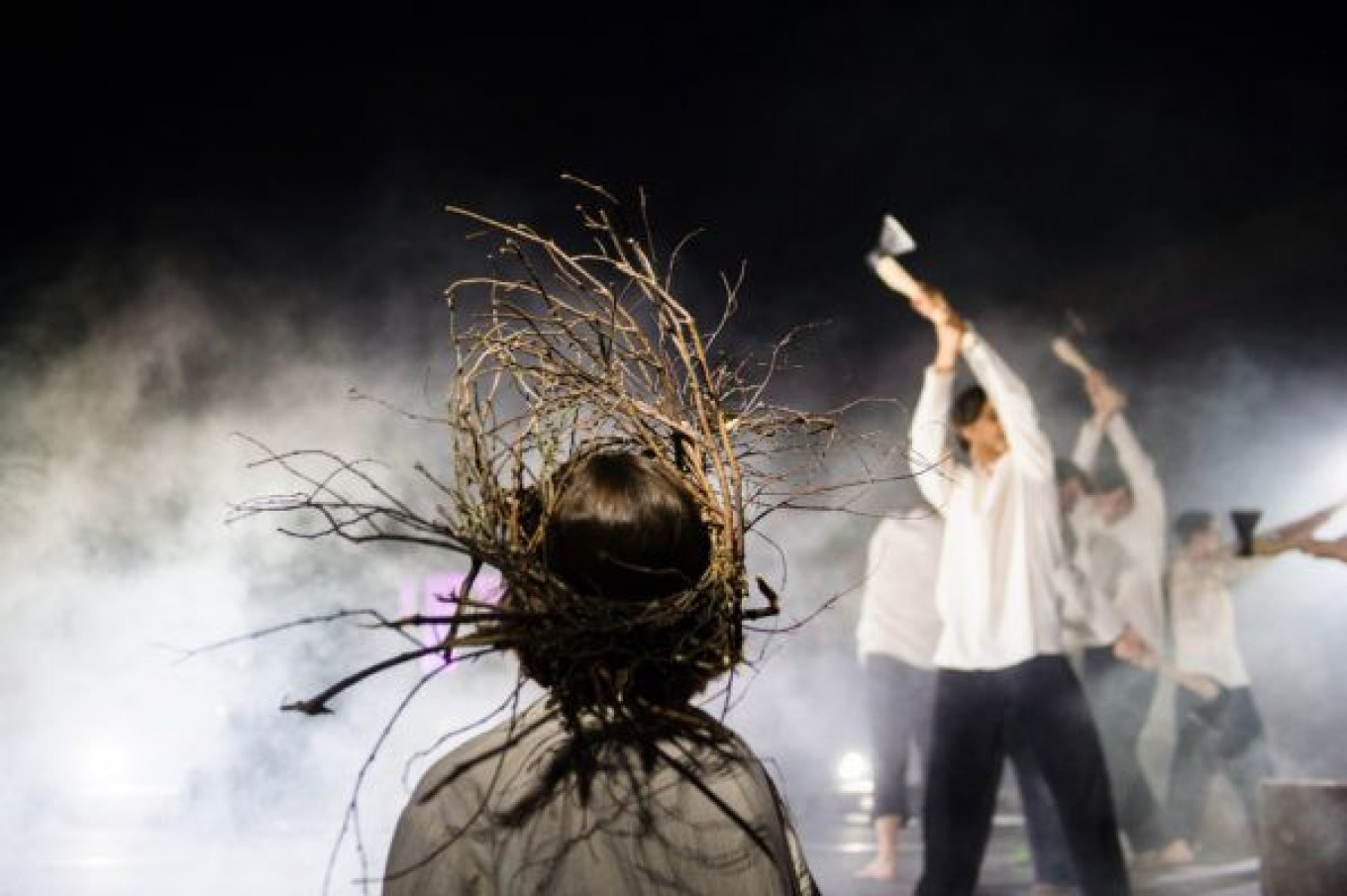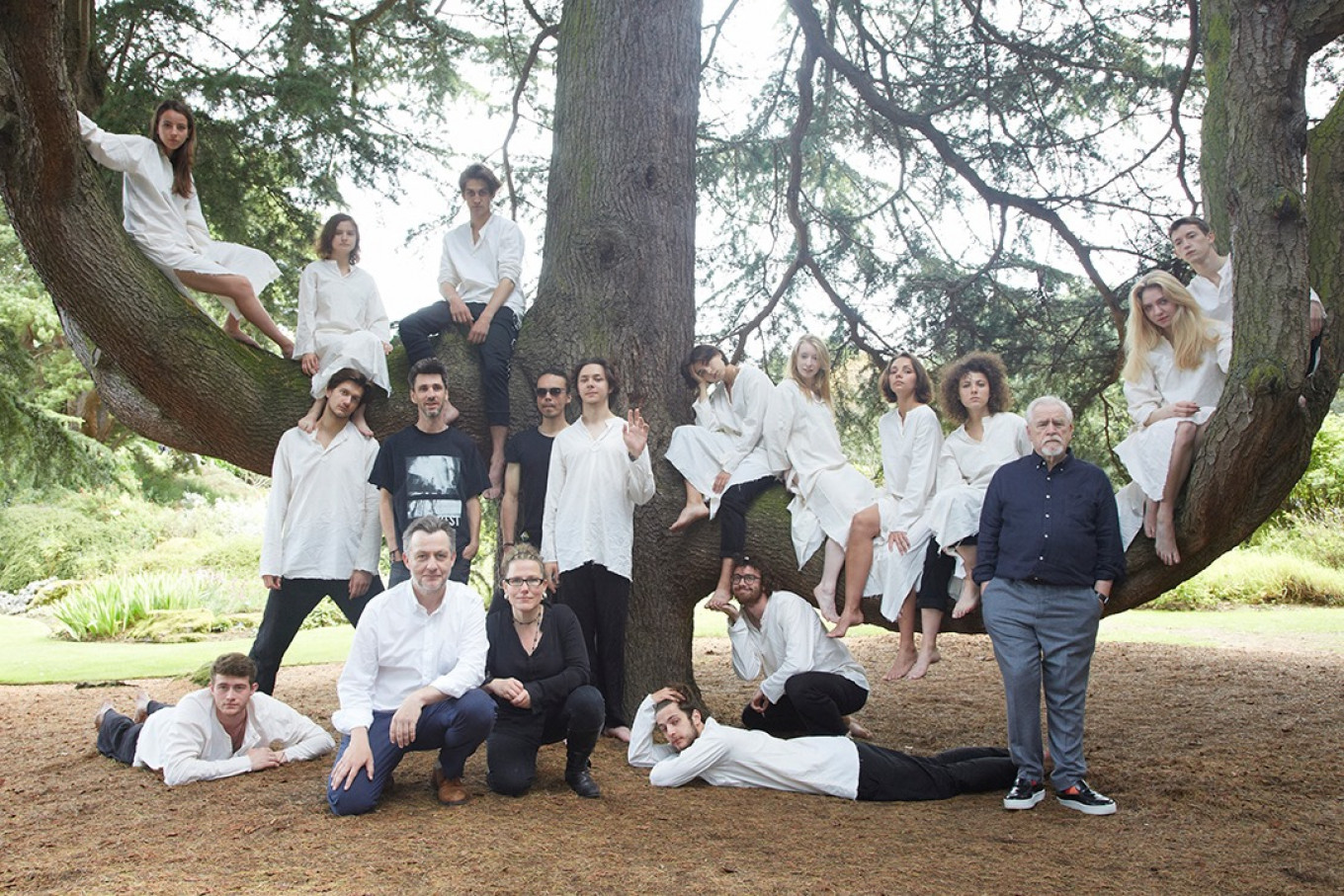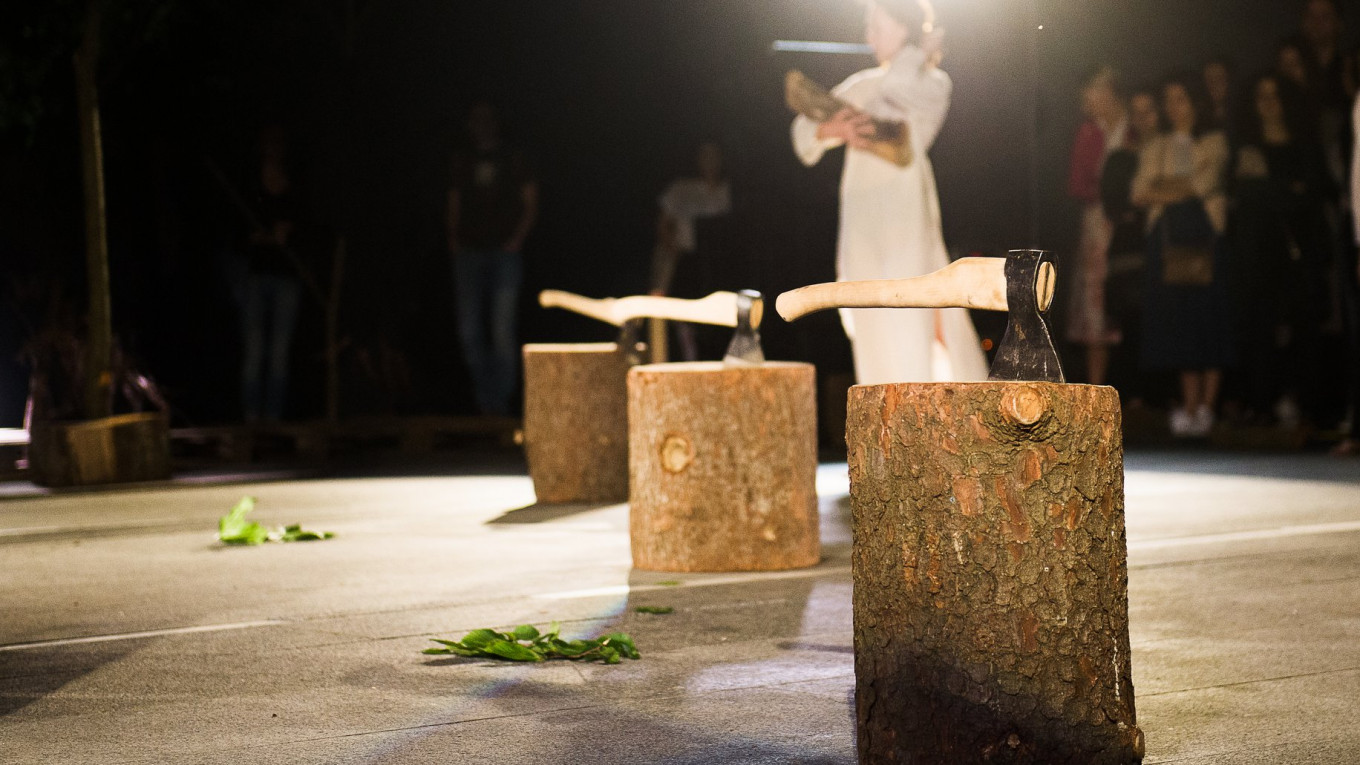Every year thousands of performers and visitors descend upon Scotland in late summer to attend the Edinburgh Festival Fringe, the world’s biggest festival of performance arts, from stand-up comedy to opera.
This year among the nearly 4,000 shows were several from Russia including “Forest,” a work of physical theater directed by Dmitry Melkin and performed by members of the Brusnikin Studio, a collective of young actors from the Moscow Art Theater School.
The Studio was formed by the late Dmitry Brusnikin, an actor, director and teacher of drama at the Moscow Art Theater School. The idea of the studio was to take classically trained drama students and set them free them to explore and master dance, movement, circus, video, music, song, puppetry with many different directors, choreographers and artists in every kind of venue, from cafes to public squares. The troupe performs more than 20 different pieces in Moscow and other Russian cities.
Dmitry Melkin, a bright star in the pantheon of new Russian theater, was invited to work with Brusnikin’s young actors. In an interview with The Moscow Times, Melkin said that he jumped at the chance to bring physical theater — “a fusion, a different key, a different school” — to an academic theater.
One of his works is “Forest,” inspired, Melkin said, by the “Physics” of Aristotle and the works of Russian philosopher Vladimir Bibikhin. From these texts came the notion of movement and change, as well as the notion of matter which, in ancient Greek, is the word for wood. The performance is, Melkin said, “rather minimalist, half-liturgical in form… a transposition of philosophical texts to the stage using the ideas of [Aristotelian] physics, which is congruent with the notion of physical theater.” The performers, mostly city folk, spent several weeks in a forest to gain a sense of it.

With no spoken words or narrative, “Forest” is not easy to understand or even to experience. On stage are bits of the forest: tree trunks, branches, sand, branches, stones. Images are projected onto a round disc suspended in the air: black and white images of forests, rivers, the performers in the woods and in the water, trees, logging, industrial use of natural resources. Fourteen performers — seven men and seven women — dressed in loose, homespun garments, take part in a series of vignettes. Sounds of the forest, both natural and man-made, voices, and music weave among the sounds and singing of the performers as they explore the connections and disconnections between human beings and the forest in movement, rituals that suggest pagan or folk traditions, or seem to embody the trees themselves.
After performing in several venues and cities in Russia to enthusiastic reviews, the troupe had a chance to go to the Fringe. “I didn’t do anything to make it happen,” Melkin said. “It happened thanks to circumstances and the English side.”
The English side was the Cox family.
The Cox Russian connection
The performance took place largely thanks to Margaret and Alan Cox, but indirectly thanks to their father, Brian Cox, who has had a long association with Russian theater.
That began in the late 1980s, when he got involved in teaching exchanges arranged by the British Russian Drama Academy, which led to him bringing a Russian language production of Arthur Miller’s “The Crucible” to the Fringe in 1989. Alan Cox spent several weeks on an exchange in Moscow during his drama school years and continued to be involved, in both his repertory and his venues, with Russian theater. Margaret studied Russian in St. Petersburg and lived in Moscow as a teacher in the 1990s.
Margaret Cox is a producer and organizer; Alan Cox performed at the Fringe several times in various capacities and knew the somewhat arcane ropes of this carnival-like festival. Together they brought the "Forest" to the Fringe.
The timing was both fraught and apt. As protests roiled in Moscow and other Russian cities with mass arrests, performers off-stage were glued to their cell phones, scrolling through the news and social media. At the same time, huge fires were sweeping through Siberia, destroying 3 million hectares (about 7.4 million acres), which pointed to the fragility and crucial importance of the world’s forested land. The performers did a pop-up “Save the Siberian Forest” action on the Royal Mile, and then joined Brian Cox as he planted a Siberian birch in the Royal Botanical Gardens.
And they performed “Forest” to larger and larger crowds.
Wordless translation
The question for Dmitry Melkin before the trip was how Western audiences would understand “Forest.” Would they perceive the essential “eastern-ness” of it?
Indeed, how does physical theater translate to another culture? Without the narrative of conventional theater, how would foreign audiences make sense of what they were seeing?
In the end, Melkin was largely pleased by the reviews and responses but wasn’t sure if they had been understood. After the run, he said he thought the troupe was perceived as “foreign and exotic… and maybe they had had expectations that it would be a “show,” that there would be something to get out of it. Some people seemed to want something they could use, as if we were a factory.”

Alan Cox, who watched every performance and every audience, didn’t think the audience saw “Forest” as art from the East.
But at the start of each performance, the audience was at somewhat of a loss. “This doesn’t have dialog," he told The Moscow Times. "So you’re guided by events and you start to make up your own stories…. You know that it’s an invitation into a kind of a theatrical meditation on human beings’ relation to the forest. There are seven men and seven women, but you wonder: ‘What am I watching? Are they humans? Is it the rites of spring?’ Its imagistic nature makes you create your own narrative.”
With physical theater, he continued, “there are intentions on part of the performance and archetypes that are up for grabs, depending on who you are… Of course, it’s culturally influenced but it’s not a historical narrative. You might know about industrialization and logging, and you might know that there was a brutal cleansing of the Siberian forest by Stalin, and there is documentary footage in the projections, but these are archetypal images of logging and working people intercut with footage of the performers capering in nature.”
Towards the end, the performance reaches the “theatrical crescendo” of the performers falling like enormous logs. Cox watched this every day. “That’s the moment where [the audiences] go ‘Wow!’”
“At the end of it,” he said, “the audience whoops and cheers. They know they’ve seen something, and if intellectually perhaps they can’t comprehend it all, it has engaged them emotionally and theatrically.”
And that sounds like a very successful run.
Below is a version of "Forest" performed at the Meyerhold Center in Moscow.
A Message from The Moscow Times:
Dear readers,
We are facing unprecedented challenges. Russia's Prosecutor General's Office has designated The Moscow Times as an "undesirable" organization, criminalizing our work and putting our staff at risk of prosecution. This follows our earlier unjust labeling as a "foreign agent."
These actions are direct attempts to silence independent journalism in Russia. The authorities claim our work "discredits the decisions of the Russian leadership." We see things differently: we strive to provide accurate, unbiased reporting on Russia.
We, the journalists of The Moscow Times, refuse to be silenced. But to continue our work, we need your help.
Your support, no matter how small, makes a world of difference. If you can, please support us monthly starting from just $2. It's quick to set up, and every contribution makes a significant impact.
By supporting The Moscow Times, you're defending open, independent journalism in the face of repression. Thank you for standing with us.
Remind me later.







